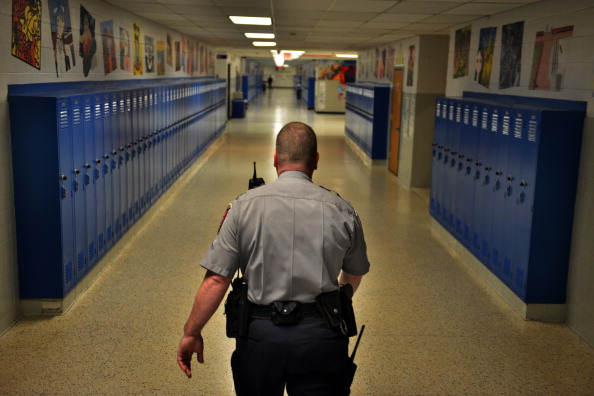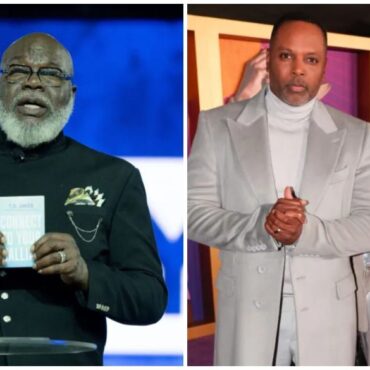Listeners:
Top listeners:
-
play_arrow
We Boss Radio True Hip Hop and R&B
Great Music Is Great Music ...Regardless of who the artist is.


West Springfield High School in Springfield, Virginia, on January 18, 2012. | Source: The Washington Post / Getty
In 1975, only 1% of public schools had their own police officers. Today, 44% do. A large reason for the increase is the Violent Crime Control and Law Enforcement Act of 1994, which led to the creation of the federal Community Oriented Policing Services to oversee funds for the hiring of police in schools. Another reason is the Columbine High School massacre in 1999. From the federal government down to individual districts, the idea that schools need police officers to keep kids safe is prevalent.
However, research shows that police officers in schools don’t always prevent violence, including school shootings. In fact, their presence can harm students.
MORE: Akron School Cop Under Investigation After Video Shows He Punched Black Student In Head
Here are five reasons police in schools, also known as school resource officers, actually make students less safe in school:
1. They don’t address the root problems.
State legislators that advocate for police in schools believe that by hardening schools – increasing police presence, adding metal detectors, requiring clear backpacks and mandating active-shooter safety drills – students will be safer from school shootings.
Academic research supports a different strategy. Most school shooters are known to administrators prior to committing assault. Many of these students struggle to make friends, experience challenges in their home lives and have multiple behavioral and mental health needs that haven’t been addressed.
School police officers cannot fix societal problems. Instead, researchers and policy advocates recommend that districts invest in the people who are better equipped to address these issues, like social workers and therapists.
2. Their role is not well defined.
The role of school police officers, as well as their training, varies from school to school. This means that some may have a more positive impact on students than others.
Research shows that school resource officers are effective at detecting drug-related activity on campus and addressing violent crime related to gang activity in schools. But officers do not lower instances of bullying and low-level crime like vandalism and schoolyard fights.
School police officers play various roles on campus, but research shows that they are most effective at helping students when they focus on specific types of crime occurring in the school or building relationships with the students who are known to commit them. When they focus on punishment and discipline, their effectiveness decreases.

Crosses honor those who lost their lives during the Robb Elementary School shooting in Uvalde, Texas, on November 8, 2022. | Source: MARK FELIX / Getty
3. They do not increase students’ feelings of safety.
Most students either do not realize that their school has a school resource officer or don’t mind that one is present. In fact, most students report liking the officer at their school.
However, students report that the presence of school resource officers does not make them feel more positive about school safety and climate. Students report feeling safe in the beginning of the year with officers in the building but feel less safe as the year goes on. The more contact students have with an officer, for any reason, the more disconnected they begin to feel. Researchers suggest a possible reason why is because they start to worry that their own behavior can result in harsh punishment.
This can lead to other negative consequences, like increased absenteeism, failure to graduate and delinquency outside of school.
Students who frequently encounter school police officers can begin to develop subconscious feelings that their school is unsafe, particularly if their encounters were related to discipline. Even students who don’t directly interact with the officers, but witness other students get arrested, can begin to feel afraid that they will be arrested for minor disturbances, too.
4. They contribute to the “school-to-prison pipeline.”
Research shows that the presence of school police officers increases the likelihood that a school will report common forms of student misbehavior, like cafeteria fights and vandalism, to law enforcement agencies – contributing to what is known as the “school-to-prison pipeline” by criminalizing such conduct.
For example, schools that use on-campus police for law enforcement and other duties, like mentoring, are 118% more likely to record property crimes than schools without police. Schools that use officers primarily for student discipline and crime response report 91% more nonserious crimes, property crimes and instances of disorderly conduct to police than similar schools that don’t use school police.
Supporters of school police officers may argue that reporting crimes keeps students safer. However, for some students, the consequences can be devastating and lifelong. For example, in one study, North Carolina middle schools with on-campus police officers recorded 38% fewer violent offenses than schools without police. But they were also more likely to respond to student misconduct with harsher disciplinary practices such as school suspension, transfers to alternative learning environments, expulsions and referrals to police. Studies often find that these exclusionary responses are mostly experienced by Black and Hispanic students.
5. They sometimes infringe on students’ rights.
The U.S. Supreme Court ruled in 1969 that students do not “shed their constitutional rights to freedom of speech or expression at the schoolhouse gate.”
However, research is clear about the threats to students’ rights that school police officers can pose. These include invasion of privacy, unlawful searches and seizures and violations of rights of students with disabilities and special education students.
Schools that plan to keep their police officers can follow these guidelines to ensure they are more effective in actually helping students:
- Build strong relationships between school administrators and school police officers, which can increase the success of school police programs.
- Clearly outline the roles and duties of school police officers.
- Work as a team with officers and other experts, like social workers and therapists. Simply having a school resource officer isn’t enough to prevent violence.
- Train officers in child development and de-escalation.
- Integrate officers into school and district leadership roles by making them part of the leadership team and providing them with the same professional development as teachers.
As the nation’s schools continue to grapple with how to keep students safe, a careful review of the research shows that school police officers may not be the answer.
Monic Behnken, Associate Dean, Department of Sociology and Criminal Justice, Iowa State University
This article is republished from The Conversation under a Creative Commons license. Read the original article.
![]()
SEE ALSO:
Video Shows Tennessee School Cop Brutally Arrest Black Student Over A Game Of Kickball
Students Suspended For Brawl While School Cop In Video Who Assaulted One Of Them Goes Unpunished
Similar posts
-

To our fellow racial justice friends and colleagues: the time for avoidance is over. Antisemitism is not someone else’s issue. Read More

MADRID, April 26, 2025 /PRNewswire/ — Simone Biles stepped to the top of the Olympic podium three times in Paris last summer, and tonight she took a bow once more, this time on the stage of the Laureus World Sports Awards as she received her fourth Laureus Read More

Bishop T.D. Jakes announced he is passing the leadership of The Potter’s House to his daughter, Sarah Jakes Roberts, and her husband, Toure Roberts. Read More

Starting May 7th, travelers will need a REAL ID to fly within the U.S. or access federal facilities. Regular state-issued driver’s licenses or ID cards won’t cut it unless they’re REAL ID compliant. The switch, mandated by Congress in 2005 Read More
@2024 Copyright We Boss Radio - All Rights Reserved




